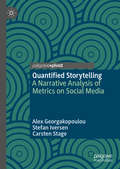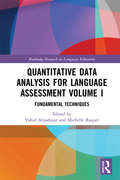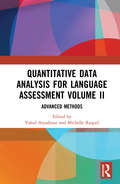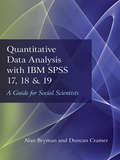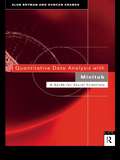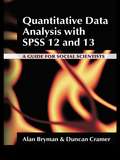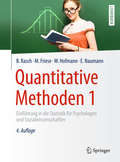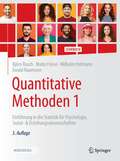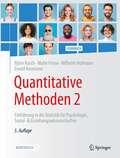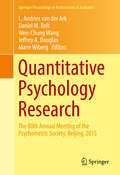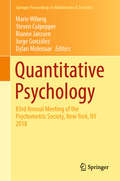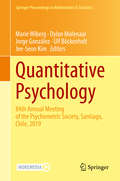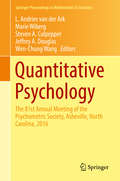- Table View
- List View
Quality of Life in Japan: Contemporary Perspectives on Happiness (Quality of Life in Asia #13)
by Ming-Chang Tsai Noriko IwaiThis edited volume approaches the life experiences and well-being of Japanese people from an empirical perspective. It explores the current trend of happiness among Japanese over time and examines the association of income, lifestyle, and perceived life conditions using modern econometric models with supplementary qualitative observations. Issues relating to ageing, gender, household division of labour, and emigration are also examined to provide a wide scope of results based on both survey and field methods for culturally sensitive researchers. Going beyond the conventional cultural interpretation of the uniqueness of the Japanese case, this book provides timely, empirical evidence for understanding how the various social groups comprising the Japanese population have enjoyed a better quality of life, while some groups are very dissatisfied with social arrangements and have elected to emigrate. The book is a pioneering endeavour to reveal the detailed structure of quality of life and well-being in Japanese society.
Quality of Life, Environmental Changes and Subjectivity: A Contribution to a New Line of Research on Climate Change
by Sônia Regina da Cal Seixas João Luiz de Moraes HoefelIn this volume, the authors consider how environmental changes affect our social, cultural and political lives and, in doing so, have a direct influence on individuals’ health. In contrast to previous research in the area, da Cal Seixas and de Moraes Hoefel emphasize both physical health and mental health as measures of human suffering, in an approach informed by the concept of subjectivity. Ultimately, the authors argue that contemporary environmental changes have a significant effect on the mental and physical wellbeing of the world’s population, and that analysis and proposals for action should address both concerns in an effort to improve our quality of life.
Qualitätsmanagement und gute Arbeit: Grundlagen einer gelingenden Qualitätsentwicklung für Einsteiger und Skeptiker (essentials)
by Rainer ZechIn diesem Essential wird das traditionelle Qualitätsmanagement als verdecktherrschaftliches Disziplinarsystem entschlüsselt und die Frage diskutiert, was unter Qualität substanziell zu verstehen ist. Der Autor argumentiert dafür, dass die Qualitätsfrage in den Kontext der großen Thematik eines guten Lebens in einer gerechten Gesellschaft gehört. Zu diesem Zweck wird sowohl das Gute als auch das Gerechte kurz skizziert. Daraus werden die Voraussetzungen einer entsprechend gelingenden Qualitätsentwicklung abgeleitet, um schließlich beispielhaft für den Bereich der personenbezogenen sozialen Dienstleistungen ein Qualitätsentwicklungssystem vorzustellen, das den Fallen der Disziplinierung entgeht und die Entscheidung über die Definition guter Arbeit - als Prozess und Ergebnis - in die Hände der Arbeitenden gibt.
Quan la vida ens dol: Construir la salut mental i recuperar la felicitat
by Jaume FunesQuan la vida ens dol és una reflexió rigorosa que vol ajudar les persones perquè prenguin consciència que una bona salut mental és part del camí que porta a seguir avançant cap a la felicitat. En un moment o altre de la vida apareixen els malestars. Habitualment, el magatzem de les experiències positives viscudes, les habilitats vitals apreses i la proximitat activa d'altres persones fan que els superem. Però hi ha vegades en què això no és així, i el dolor de viure encaixats en una existència que no volem fa que tot es trastorni. Sigui quina sigui la situació, ens trobem enmig d'alteracions d'una part de la salut, la mental, per a la qual no hi ha acord sobre com descriure-la, com explicar-la, com dedicar-hi l'atenció adequada. I acabem immersos en una mena de supermercat de les teràpies, en una gestió interessada dels fàrmacs, en una absència d'escolta i d'acompanyament. Aquest llibre pretén ajudar a tenir una visió personal més coherent sobre la salut i la malaltia mentals, a compartir un discurs social que aporti i que no segregui, a ampliar el grup dels professionals que comparteixen una visió integradora i que donen respostes que humanitzen, a exigir dels nostres responsables polítics una planificació coherent i no la venda d'etiquetes i de serveis etiquetats per curar les malalties mentals.
Quanta and Mind: Essays on the Connection between Quantum Mechanics and the Consciousness (Synthese Library #414)
by Carlos Montemayor J. Acacio de BarrosThis edited volume examines aspects of the mind/consciousness that are relevant to the interpretations of quantum mechanics. In it, an international group of contributors focus on the possible connections between quantum mechanics and consciousness. They look at how consciousness can help us with quantum mechanics as well as how quantum mechanics can contribute to our understanding of consciousness. For example, what do different interpretations aimed at solving the measurement problem in quantum mechanics tell us about the nature of consciousness, such as von Neumann's interpretation? Each interpretation has, associated to it, a corresponding metaphysical framework that helps us think about possible “models” of consciousness. Alternatively, what does the nature of consciousness tell us about the role of the observer and time reversibility in the measurement process? The book features 20 papers on contemporary approaches to quanta and mind. It brings together the work of scholars from different disciplines with diverse views on the connections between quanta and mind, ranging from those who are supportive of a link between consciousness and quantum physics to those who are very skeptical of such link. Coverage includes such topics as free will in a quantum world, contextuality and causality, mind and matter interaction, quantum panpsychism, the quantum and quantum-like brain, and the role of time in brain-mind dynamics.
Quantified Storytelling: A Narrative Analysis of Metrics on Social Media
by Carsten Stage Alex Georgakopoulou Stefan IversenThis book interrogates the role of quantification in stories on social media: how do visible numbers (e.g. of views, shares, likes) and invisible algorithmic measurements shape the stories we post and engage with? The links of quantification with stories have not been explored sufficiently in storytelling research or in social media studies, despite the fact that platforms have been integrating sophisticated metrics into developing facilities for sharing stories, with a massive appeal to ordinary users, influencers and businesses alike. With case-studies from Instagram, Reddit and Snapchat, the authors show how three types of metrics, namely content metrics, interface metrics and algorithmic metrics, affect the ways in which cancer patients share their experiences, the circulation of specific stories that mobilize counter-publics and the design of stories as facilities on platforms. The analyses document how numbers structure elements in stories, indicate and produce engagement and become resources for the tellers’ self-presentation. This book will be of interest to students and scholars working in the fields of narrative and social media studies, including narratology, biography studies, digital storytelling, life-writing, narrative psychology, sociological approaches to narrative, discourse and sociolinguistic perspectives.
Quantitative Data Analysis for Language Assessment Volume I: Fundamental Techniques (Routledge Research in Language Education)
by Vahid Aryadoust Michelle RaquelQuantitative Data Analysis for Language Assessment Volume I: Fundamental Techniques is a resource book that presents the most fundamental techniques of quantitative data analysis in the field of language assessment. Each chapter provides an accessible explanation of the selected technique, a review of language assessment studies that have used the technique, and finally, an example of an authentic study that uses the technique. Readers also get a taste of how to apply each technique through the help of supplementary online resources that include sample data sets and guided instructions. Language assessment students, test designers, and researchers should find this a unique reference as it consolidates theory and application of quantitative data analysis in language assessment.
Quantitative Data Analysis for Language Assessment Volume II: Advanced Methods
by Vahid Aryadoust Michelle RaquelQuantitative Data Analysis for Language Assessment Volume II: Advanced Methods emonstrates advanced quantitative techniques for language assessment. The volume takes an interdisciplinary approach and taps into expertise from language assessment, data mining, and psychometrics. The techniques covered include Structural Equation Modeling, Data Mining, Multidimensional Psychometrics and Multilevel Data Analysis.Volume II is distinct among available books in language assessment, as it engages the readers in both theory and application of the methods and introduces relevant techniques for theory construction and validation. This book is highly recommended to graduate students and researchers who are searching for innovative and rigorous approaches and methods to achieve excellence in their dissertations and research. It is also a valuable source for academics who teach quantitative approaches in language assessment and data analysis courses.
Quantitative Data Analysis with IBM SPSS 17, 18 & 19: A Guide for Social Scientists
by Alan Bryman Duncan CramerThis latest edition has been fully updated to accommodate the needs of users of SPSS Releases 17, 18 and 19 while still being applicable to users of SPSS Releases 15 and 16. As with previous editions, Alan Bryman and Duncan Cramer continue to offer a comprehensive and user-friendly introduction to the widely used IBM SPSS Statistics. The simple, non-technical approach to quantitative data analysis enables the reader to quickly become familiar with SPSS and with the tests available to them. No previous experience of statistics or computing is required as this book provides a step-by-step guide to statistical techniques, including: Non-parametric tests Correlation Simple and multiple regression Analysis of variance and covariance Factor analysis. This book comes equipped with a comprehensive range of exercises for further practice, and it covers key issues such as sampling, statistical inference, conceptualization and measurement and selection of appropriate tests. The authors have also included a helpful glossary of key terms. The data sets used in Quantitative Data Analysis with IBM SPSS 17, 18 and 19 are available online at http://www.routledgetextbooks.com/textbooks/_author/bryman-9780415579193/; in addition, a set of multiple-choice questions and a chapter-by-chapter PowerPoint lecture course are available free of charge to lecturers who adopt the book.
Quantitative Data Analysis with Minitab: A Guide for Social Scientists
by Alan Bryman Duncan CramerQuantitative data analysis is now a compulsory component of most degree courses in the social sciences and students are increasingly reliant on computers for the analysis of data. Quantitative Data Analysis with Minitab explains statistical tests for Minitab users using the same formulae free, non technical approach, as the very successful SPPS version.Students will learn a wide range of quantitative data analysis techniques and become familiar with how these techniques can be implemented through the latest version of Minitab. Techniques covered include univariate analysis (with frequency table, dispersion and histograms), bivariate (with contingency tables correlation, analysis of varience and non-parametric tests) and multivariate analysis (with multiple regression, path analysis, covarience and factor analysis). In addition the book covers issues such as sampling, statistical significance, conceptualisation and measurement and the selection of appropriate tests. Each chapter concludes with a set of exercises.Social science students will welcome this integrated, non mathematical introduction to quantitative data anlysis and the minitab package.
Quantitative Data Analysis with SPSS 12 and 13: A Guide for Social Scientists
by Alan Bryman Duncan CramerThis new edition has been completely updated to accommodate the needs of users of SPSS Release 12 and 13 for Windows, whilst still being applicable to those using SPSS Release 11 and 10. Alan Bryman and Duncan Cramer provide a non-technical approach to quantitative data analysis and a user-friendly introduction to the widely used SPSS. No previous familiarity with computing or statistics is required to benefit from this step-by-step guide to techniques including: Non-parametric tests Correlation Simple and multiple regression Multivarate analysis of variance and covariance Factor analysis The authors discuss key issues facing the newcomer to research, such as how to decide which statistical procedure is suitable, and how to interpret the subsequent results. Each chapter contains worked examples to illustrate the points raised and ends with a comprehensive range of exercises which allow the reader to test their understanding of the topic. This new edition of this hugely successful textbook will guide the reader through the basics of quantitative data analysis and become an essential reference tool for both students and researchers in the social sciences. The datasets used in Quantitative Data Analysis for SPSS Release 12 and 13 are available online at www.psypress.com/brymancramer/ .
Quantitative Methoden 1: Einführung in die Statistik für Psychologen und Sozialwissenschaftler (Springer-Lehrbuch)
by Wilhelm Hofmann Björn Rasch Malte Friese Ewald NaumannWelche Angst plagt die meisten Studienanfänger im Psychologie-Studium? Die Angst vor der Statistik-Prüfung! Hier schaffen wir Abhilfe, denn die Statistik ist ein wichtiges Handwerkszeug, um zu verstehen, wie die Psychologie Erkenntnisse gewinnt und ihre Forschungsergebnisse zu bewerten sind – und wenn die Statistik verständlich erklärt ist, gibt es keinen Grund zur Panik! Mit den beiden Bänden Quantitative Methoden 1/2 meistern Sie die Grundlagen der Statistik! Anwendungsbezogen und verständlich werden hier die Inhalte der Vorlesungen Quantitative Methoden, Statistik oder Methodenlehre erklärt. Band 1 umfasst die Themen deskriptive Statistik, Grundzüge der Inferenzstatistik und den t-Test sowie Zusammenhangsmaße und Regression. Mit Verständnisfragen und Antworten, Glossar der wichtigsten Statistik-Begriffe und Verteilungstabellen. – Außerdem mit vielen kostenlosen Zusatzmaterialien auf der begleitenden Lehrbuch-Website: Mehrere hundert Extraseiten mit Anleitungen zur konkreten Durchführung der behandelten statistischen Verfahren mit SPSS und R, Informationen zur Durchführung von Teststärkeanalysen und Stichprobenumfangsplanungen mit G*Power sowie Beispielaufgaben – alles inklusive notwendiger Datensätze. Und ganz NEU in der 4. Auflage: Zahlreiche Erklärungsvideos zu wichtigen Formeln und Zusammenhängen!
Quantitative Methoden 1: Einführung in die Statistik für Psychologie, Sozial- & Erziehungswissenschaften
by Wilhelm Hofmann Björn Rasch Malte Friese Ewald NaumannDieses Lehrbuch macht Dich fit für die Statistik-Prüfung – hier geht es um die Deskriptive Statistik sowie um die ersten Schritte in Inferenzstatistik, z.B. den t-Test. Also Dinge, die in vielen sozialwissenschaftlichen Studiengängen, wie z.B. Psychologie, Soziologie oder Erziehungswissenschaften, auf dem Lehrplan stehen. Vielen macht die Statistik Angst – aber mit diesem Buch wirst Du die Prüfung meistern, weil Dir hier alles sehr verständlich und ergänzt durch kostenfreie Videos und umfangreiche zusätzliche Materialien erklärt wird.
Quantitative Methoden 2: Einführung in die Statistik für Psychologie, Sozial- & Erziehungswissenschaften
by Wilhelm Hofmann Björn Rasch Malte Friese Ewald NaumannDieses Lehrbuch macht Dich fit für die Statistik-Prüfung – hier geht es u.a. um Varianzanalysen und Verfahren für Rang- und Nominaldaten. Also Dinge, die in vielen sozialwissenschaftlichen Studiengängen, wie z.B. Psychologie, Soziologie oder Erziehungswissenschaften, auf dem Lehrplan stehen. Mit diesem Buch wirst Du die Prüfung meistern, weil Dir hier alles sehr verständlich und ergänzt durch kostenfreie Videos und umfangreiche zusätzliche Materialien erklärt wird.
Quantitative Psychological Research: The Complete Student's Companion
by David Clark-CarterThis book expertly guides the reader through all stages involved in undertaking quantitative psychological research, from accessing the relevant literature, through designing and conducting a study, analysing and interpreting data, and finally reporting the research. This third edition includes two new chapters - on preliminary checking of data and allowing for additional variables when comparing the means of different conditions - and expands on original topics such as choosing sample sizes and how to test for mediation effects. It also contains increased coverage of tests and further detail of techniques and terms which psychologists will meet when working with those in the medical professions. As the chapters focus on choosing appropriate statistical tests and how to interpret and report them (rather than the detailed calculations, which appear in appendices), the reader is able to gain an understanding of a test without being interrupted by the need to understand the complex mathematics behind it. In addition, for the first time, the book is accompanied by an online bank of multiple choice questions. The book helps readers to: Locate reports of relevant existing research Design research while adhering to ethical principles Identify various methods which can be used to ask questions or observe behaviour Choose appropriate samples Display and analyse findings numerically and graphically to test hypotheses Report psychological research in a variety of ways. As such, the book is suitable for psychology students and professionals at all levels, and is particularly useful to those working in Health and Clinical Psychology.
Quantitative Psychological Research: The Complete Student's Companion
by David Clark-CarterQuantitative Psychological Research: The Complete Student's Companion expertly guides the reader through all the stages involved in undertaking quantitative psychological research: designing a study, choosing a sample of people, undertaking the study, analysing the data, and reporting the research. Accessibly written and clearly presented, the book is designed for anyone learning to conduct quantitative psychological research. It covers the full research process, from the original idea to reporting the completed study, emphasising the importance of looking beyond statistical significance in evaluating data. The book provides step-by-step guidance on choosing, interpreting and reporting the appropriate analysis, featuring worked examples and extended calculations as appendices for advanced readers. This edition features new chapters on exploratory factor analysis, logistic regression and Bayesian statistics, and has been thoroughly updated throughout to reflect the latest research practices. Care has been taken to avoid tying the book to any specific statistical software, providing readers with a thorough grounding in the basics no matter which package they go on to use. Whether you’re at the beginning of your undergraduate degree or working towards your masters or doctorate, this book will be invaluable for anyone looking to understand how to conduct quantitative psychological research.
Quantitative Psychological Research: The Complete Student's Companion
by David Clark-CarterQuantitative Psychological Research: The Complete Student's Companion, expertly guides the reader through all the stages involved in undertaking quantitative psychological research: designing a study, choosing a sample of people, undertaking the study, analysing the data, and reporting the research. Accessibly written and clearly presented, the book is designed for anyone learning to conduct quantitative psychological research as well being a reference work for professional psychologists. It covers the full research process, from the original idea to reporting the completed study, emphasizing the importance of looking beyond statistical significance in evaluating data. The book provides step-by-step guidance on choosing, interpreting and reporting the appropriate analysis, featuring worked examples and extended calculations as appendices for readers who wish to delve further. This edition features a new chapter examining ideas on how causality might be identified when data is not obtained from an experiment and has been thoroughly updated throughout to reflect latest research practices. Care has been taken to avoid tying the book to any specific statistical software, providing readers with a thorough grounding in the basics no matter which package they go on to use.This is a must read for professional psychologists as well as students and researchers of Psychology, Statistics and Research Methods. This book is also invaluable for anyone interested in conducting quantitative psychological research.
Quantitative Psychological Research: The Complete Student's Companion
by David Clark-CarterQuantitative Psychological Research: The Complete Student's Companion, expertly guides the reader through all the stages involved in undertaking quantitative psychological research: designing a study, choosing a sample of people, undertaking the study, analysing the data, and reporting the research.Accessibly written and clearly presented, the book is designed for anyone learning to conduct quantitative psychological research as well being a reference work for professional psychologists. It covers the full research process, from the original idea to reporting the completed study, emphasizing the importance of looking beyond statistical significance in evaluating data. The book provides step-by-step guidance on choosing, interpreting and reporting the appropriate analysis, featuring worked examples and extended calculations as appendices for readers who wish to delve further.This edition features a new chapter examining ideas on how causality might be identified when data is not obtained from an experiment and has been thoroughly updated throughout to reflect latest research practices. Care has been taken to avoid tying the book to any specific statistical software, providing readers with a thorough grounding in the basics no matter which package they go on to use.This is a must read for professional psychologists as well as students and researchers of Psychology, Statistics and Research Methods. This book is also invaluable for anyone interested in conducting quantitative psychological research.
Quantitative Psychology Research
by Wen-Chung Wang L. Andries van der Ark Daniel M. Bolt Jeffrey A. Douglas Marie WibergThe research articles in this volume cover timely quantitative psychology topics, including new methods in item response theory, computerized adaptive testing, cognitive diagnostic modeling, and psychological scaling. Topics within general quantitative methodology include structural equation modeling, factor analysis, causal modeling, mediation, missing data methods, and longitudinal data analysis. These methods will appeal, in particular, to researchers in the social sciences. The 80th annual meeting took place in Beijing, China, between the 12th and 16th of July, 2014. Previous volumes to showcase work from the Psychometric Society's Meeting are New Developments in Quantitative Psychology: Presentations from the 77th Annual Psychometric Society Meeting (Springer, 2013), Quantitative Psychology Research: The 78th Annual Meeting of the Psychometric Society (Springer, 2015), and Quantitative Psychology Research: The 79th Annual Meeting of the Psychometric Society, Wisconsin, USA, 2014 (Springer, 2015).
Quantitative Psychology Research
by Wen-Chung Wang L. Andries van der Ark Daniel M. Bolt Jeffrey A. Douglas Sy-Miin ChowThese research articles from the 79th Annual Meeting of the Psychometric Society (IMPS) cover timely quantitative psychology topics, including new methods in item response theory, computerized adaptive testing, cognitive diagnostic modeling, and psychological scaling. Topics within general quantitative methodology include structural equation modeling, factor analysis, causal modeling, mediation, missing data methods, and longitudinal data analysis. These methods will appeal, in particular, to researchers in the social sciences. The 79th annual meeting took place in Madison, WI between July 21nd and 25th, 2014. Previous volumes to showcase work from the Psychometric Society's Meeting are New Developments in Quantitative Psychology: Presentations from the 77th Annual Psychometric Society Meeting (Springer, 2013) and Quantitative Psychology Research: The 78th Annual Meeting of the Psychometric Society (Springer, 2015).
Quantitative Psychology Research
by Wen-Chung Wang L. Andries van der Ark Daniel M. Bolt Roger E. MillsapThe 78th Annual Meeting of the Psychometric Society (IMPS) builds on the Psychometric Society's mission to share quantitative methods relevant to psychology. The chapters of this volume present cutting-edge work in the field. Topics include studies of item response theory, computerized adaptive testing, cognitive diagnostic modeling, and psychological scaling. Additional psychometric topics relate to structural equation modeling, factor analysis, causal modeling, mediation, missing data methods, and longitudinal data analysis, among others. The papers in this volume will be especially useful for researchers in the social sciences who use quantitative methods. Prior knowledge of statistical methods is recommended. The 78th annual meeting took place in Arnhem, The Netherlands between July 22nd and 26th, 2013. The previous volume to showcase work from the Psychometric Society's Meeting is New Developments in Quantitative Psychology: Presentations from the 77th Annual Psychometric Society Meeting (Springer, 2014).
Quantitative Psychology: 83rd Annual Meeting of the Psychometric Society, New York, NY 2018 (Springer Proceedings in Mathematics & Statistics #265)
by Marie Wiberg Jorge González Steven Culpepper Rianne Janssen Dylan MolenaarThis proceedings volume highlights the latest research and developments in psychometrics and statistics. This book compiles and expands on selected and peer reviewed presentations given at the 83rd Annual International Meeting of the Psychometric Society (IMPS), organized by Columbia University and held in New York, USA July 9th to 13th, 2018.The IMPS is one of the largest international meetings on quantitative measurement in education, psychology and the social sciences. The last couple of years it has attracted more than 500 participants and more than 250 paper presentations from researchers around the world.Leading experts in the world and promising young researchers have written the 38 chapters. The chapters address a large variety of topics including but not limited to item response theory, multistage adaptive testing, and cognitive diagnostic models. This volume is the 7th in a series of recent volumes to cover research presented at the IMPS.
Quantitative Psychology: 84th Annual Meeting of the Psychometric Society, Santiago, Chile, 2019 (Springer Proceedings in Mathematics & Statistics #322)
by Marie Wiberg Jorge González Dylan Molenaar Ulf Böckenholt Jee-Seon KimThis proceedings volume highlights the latest research and developments in psychometrics and statistics. It represents selected and peer reviewed presentations given at the 84th Annual International Meeting of the Psychometric Society (IMPS), organized by Pontificia Universidad Católica de Chile and held in Santiago, Chile during July 15th to 19th, 2019.The IMPS is one of the largest international meetings on quantitative measurement in education, psychology and the social sciences. It draws approximately 500 participants from around the world, featuring paper and poster presentations, symposiums, workshops, keynotes, and invited presentations.Leading experts and promising young researchers have written the included chapters. The chapters address a large variety of topics including but not limited to item response theory, multistage adaptive testing, and cognitive diagnostic models. This volume is the 8th in a series of recent volumes to cover research presented at the IMPS.
Quantitative Psychology: The 81st Annual Meeting Of The Psychometric Society, Asheville, North Carolina 2016 (Springer Proceedings in Mathematics & Statistics #196)
by Marie Wiberg Jorge González Steven Culpepper Rianne Janssen Dylan MolenaarThis proceedings book highlights the latest research and developments in psychometrics and statistics. Featuring contributions presented at the 82nd Annual Meeting of the Psychometric Society (IMPS), organized by the University of Zurich and held in Zurich, Switzerland from July 17 to 21, 2017, its 34 chapters address a diverse range of psychometric topics including item response theory, factor analysis, causal inference, Bayesian statistics, test equating, cognitive diagnostic models and multistage adaptive testing. The IMPS is one of the largest international meetings on quantitative measurement in psychology, education and the social sciences, attracting over 500 participants and 250 paper presentations from around the world every year. This book gathers the contributions of selected presenters, which were subsequently expanded and peer-reviewed.
Quantitative Psychology: The 81st Annual Meeting Of The Psychometric Society, Asheville, North Carolina 2016 (Springer Proceedings in Mathematics & Statistics #196)
by Wen-Chung Wang L. Andries van der Ark Jeffrey A. Douglas Marie Wiberg Steven A. CulpepperThis proceedings volume compiles and expands on selected and peer reviewed presentations given at the 81st Annual Meeting of the Psychometric Society (IMPS), organized by the University of North Carolina at Greensboro, and held in Asheville, North Carolina, July 11th to 17th, 2016. IMPS is one of the largest international meetings focusing on quantitative measurement in psychology, education, and the social sciences, both in terms of participants and number of presentations. The meeting built on the Psychometric Society's mission to share quantitative methods relevant to psychology, addressing a diverse set of psychometric topics including item response theory, factor analysis, structural equation modeling, time series analysis, mediation analysis, cognitive diagnostic models, and multi-level models. Selected presenters were invited to revise and expand their contributions and to have them peer reviewed and published in this proceedings volume. Previous volumes to showcase work from the Psychometric Society's meetings are New Developments in Quantitative Psychology: Presentations from the 77th Annual Psychometric Society Meeting (Springer, 2013), Quantitative Psychology Research: The 78th Annual Meeting of the Psychometric Society (Springer, 2015), Quantitative Psychology Research: The 79th Annual Meeting of the Psychometric Society, Madison, Wisconsin, 2014 (Springer, 2015), and Quantitative Psychology Research: The 80th Annual Meeting of the Psychometric Society, Beijing, 2015 (Springer, 2016).





